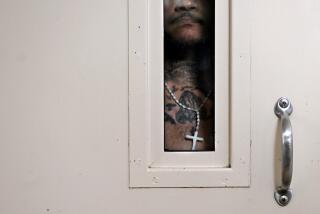Lawsuit demanding better COVID-19 practices in San Diego jails may proceed, judge says
- Share via
SAN DIEGO — A class-action lawsuit accusing Sheriff Bill Gore of not doing enough to protect San Diego County jail inmates from the deadly coronavirus may proceed to trial, a Superior Court judge ruled Friday.
The ruling by Judge Joel R. Wohlfeil came as the COVID-19 infection rate has begun to tick upward across San Diego County and the nation after notable declines this spring.
The rise in cases is largely the result of recent slumps in the number of people choosing to be vaccinated and the new Delta variant that spreads the deadly virus more easily.
The legal complaint, filed in March by a group of public interest lawyers, seeks to force the Sheriff’s Department to do more to prevent the spread of COVID-19 in the county’s seven jails, including boosting the number of vaccinations or releasing people accused of low-level crimes.
“As alleged, the defendant’s failure to act during the COVID-19 pandemic violates the constitutional rights of inmates,” Wohlfeil wrote in a tentative ruling released ahead of Friday’s ruling. “Thus, as alleged, this failure is an abuse of discretion.”
The ruling means that lawyers from the local chapter of the American Civil Liberties Union, Community Advocates for Just & Moral Governance and the Singleton, Schreiber, McKenzie & Scott law firm may proceed with their case.
The trio of law groups sued Gore in March, one day after the Sheriff’s Department announced a mass COVID-19 outbreak at the George Bailey Detention Facility that infected at least 46 inmates.
“Sheriff Gore has denied and continues to violate the constitutional and statutory right to reasonable safety and adequate medical care for thousands of incarcerated people,” the lawsuit alleged.
“He refuses to exercise his authority to immediately release people who pose minimal risk to the community,” it added. “He transfers people between facilities throughout his jail system without taking minimal precautions that could help prevent transmission of the virus.”
Numerous public health experts and academic studies have concluded that people in congregate-living settings such as hospitals, nursing homes, jails and prisons are especially vulnerable to the virus, which has killed more than 600,000 people in the United States.
As a result, many jail systems have worked to reduce the number of people in custody.
Gore agreed to lower the San Diego County jail population early in the pandemic, and the number of inmates has dropped from more than 5,000 to just over 3,800. However, suspects still are being booked into jail for low-level crimes.
Department spokeswoman Lt. Amber Baggs said sheriff’s personnel have increased cleaning and disinfecting and are working to educate inmates about the dangers posed by the virus.
“As of today, we have 3,820 persons in custody with one active case of COVID,” Baggs said by email. “The Sheriff’s Department is committed to the safety, security, health and well-being of people in our care.”
The County Counsel’s Office, which is defending the lawsuit, did not respond Thursday to requests for comment about the tentative ruling.
In court papers, county lawyers argued that Gore has released inmates and promoted vaccines to protect them from the virus, which has sickened more than 285,000 people and killed 3,786 residents in San Diego County.
“First, plaintiffs do not dispute that defendant released a substantial number of inmates at the start of the pandemic and continues to book fewer inmates because of the emergency bail schedule that is still in place,” county lawyers told the court.
“Second, defendant has shown that he can mitigate against the spread of COVID-19 without releasing more inmates,” they added. “Third, defendant cannot force inmates to accept the COVID-19 vaccine.”
Sheriff’s Department records show that the county’s largest jail — George Bailey — is currently over capacity, with 1,407 inmates. The Otay Mesa lockup is supposed to house up to 1,380 detainees.
Bailey also has the highest number of COVID-19 infections, a cumulative total of 449, according to the department website.
Data also show that few people being booked into custody are agreeing to be vaccinated against the coronavirus.
In the week ending July 10, the department offered COVID-19 vaccines to 461 people detained in San Diego County jails, agency records show. Less than one in 10 — just three dozen inmates — accepted the offer.
Since they first became available, vaccines have been administered to almost 3,000 inmates, the department said, but nearly 7,000 people have refused to be inoculated.
According to the Sheriff’s Department website on Thursday, a total of 1,291 inmates have tested positive for COVID-19 since the pandemic was declared in March 2020. One inmate died from the infection, the department said.
Eighteen people were being held in quarantine as a precaution due to possible exposure to COVID-19; there were no hospitalizations in the last week.
The department also said a total of 585 employees have tested positive for COVID-19 to date, including seven active cases. One worker died from the disease last year, officials said.
The initial lawsuit was filed on behalf of Terry Leroy Jones, who was incarcerated at the San Diego Central Jail.
Jones, who suffers from diabetes and asthma and uses a prosthetic leg, said in a lawsuit that he received inadequate medical care while in sheriff’s custody. That left him especially vulnerable to catching COVID-19, the suit said.
“The people in plaintiff’s medical unit are unable to maintain safe physical distance from each other,” the complaint alleged. “They are forced to stand in line right next to other people, with no more than a foot between them, to get food or medication.”
The latest COVID-19 infection rates reflect a sharp decline over the number of new cases being reported earlier this year.
At the height of the pandemic, the number of Sheriff’s Department employees and inmates testing positive grew by the dozens every week. On the day the lawsuit was filed, the department reported more than 1,250 inmates had been infected and seven were hospitalized by the virus.
Last year workers and inmates described jail conditions that included lack of sanitation, protective gear and cleaning products.
Inmates told the San Diego Union-Tribune they were not given proper safety equipment. They said their requests for medical treatment went ignored, they were dangerously crowded together and they had to clean up after cellmates who vomited or soiled themselves.
Guards said they were generally given a single mask to last an entire shift — or longer — and that rules requiring them to cover their faces were not uniformly enforced.
Sheriff’s Department officials said at the time that jail commanders were employing the best practices they could to stem the spread of the virus, and the jail was providing cleaners, soap and masks for inmates.
It is not clear from the lawsuit if the lawyers representing Jones will seek an injunction to force the sheriff to release some inmates or if they want the judge to impose a more strict adherence to safe-distancing rules.
More to Read
Sign up for Essential California
The most important California stories and recommendations in your inbox every morning.
You may occasionally receive promotional content from the Los Angeles Times.















